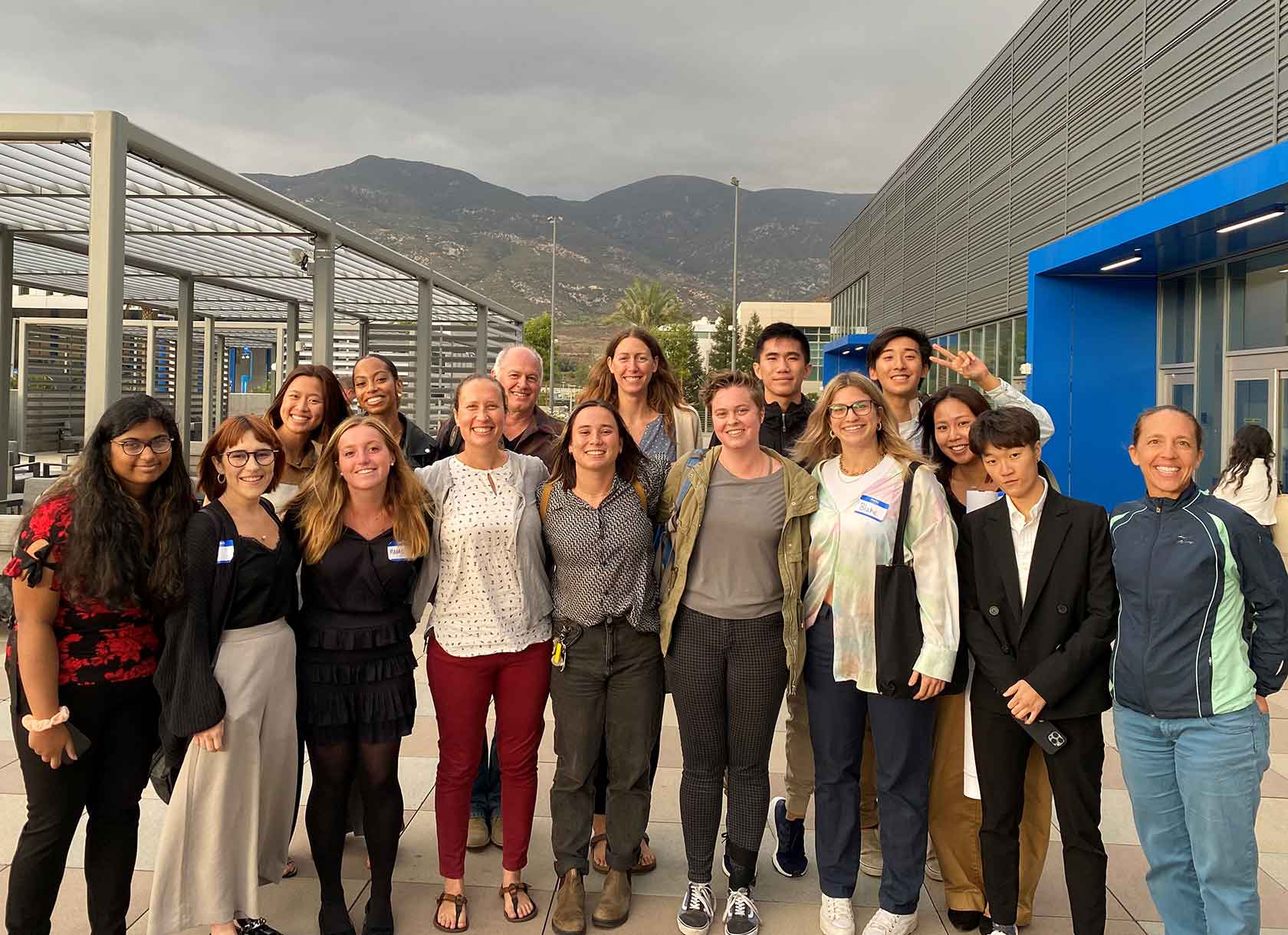By Katie Hanson ’25

This year, the Southwest Regional Meeting of Organismal Biologists hosted dozens of scientists, graduate students, and professors who shared their valuable findings with the broader organismal biology community. Scripps students presented their own ongoing research alongside these researchers—an opportunity for undergraduate students to participate in the broader scientific realm.
Juliette Rault-Wang ’23, a biology major, started working in Assistant Professor of Biology Jenna Monroy’s lab in the fall of 2020 to examine the function of titin proteins in sarcomeres, the functional unit of muscles. Studying mice, the research group examined how titin proteins contribute to muscle elasticity and stiffness during exercise. Simultaneously, they’re studying if and how titin’s properties change with exercise.
Rault-Wang is especially interested in the topic because of the incomplete research on muscle responses to exercise. For her, the conference let her share the passion project that became her thesis.
“It was a very valuable experience,” she says. “It put pressure on me to get my content together in an understandable manner and to practice presenting my topic to others, which helped me practice scientific communication. It’s great exposure to academia.”
Assistant Professor of Neuroscience Tessa Solomon-Lane and Assistant Professors of Biology Sarah Budischak and Jenna Monroy collaborated to organize a trip for students in the W.M. Keck Science Department to attend the conference together. Solomon-Lane says the conference was a chance for students to interact with one another and share their findings.
“We’re creating knowledge by doing scientific research,” Solomon-Lane says. “If you don’t share that knowledge, its impact is so limited. It also builds community with other students who are also presenting their research, other students who have shared interests that you wouldn’t have known about if they didn’t also have a poster at that conference. Whether our students stay in STEM fields or go into nearly any other field, there’s going to be a presentation element to it. Universally, it’s a really valuable experience and a broadly transferable set of skills.”
Sofia Markiewicz ’23 was eager to present at the conference for all these reasons. Unlike Rault-Wang, Markiewicz conducted her research outside of Keck, studying macroparasites in oyster populations at the University of Georgia this summer. She utilized an internship grant from the National Science Foundation to participate in the unique study.
During her internship, Markiewicz examined oysters from eight different sampling sites located across 100 miles of Georgian coast, counting and later dissecting them to examine interior parasites. The team analyzed how different variables, such as water quality and salinity, affect parasite prevalence and infection intensity. Markiewicz says she was excited to study epidemiology through research that is part of a larger experiment funded by the Georgia Department of Natural Resources.
Markiewicz’s senior thesis also focuses on her summer research, making her first conference presentation feel especially important and a way to connect with Keck faculty and students.
“It was really neat to see other students from Claremont presenting their research,” Markiewicz says. “It was also cool to have my advisor [Professor Budischak] see my research and support the people that are in her lab.”
Rault-Wang says her experience at the conference wouldn’t have been possible without her research opportunity at Keck. This spring, she’ll have spent one year on data collection and analysis for the same experiment, which has included running mice through an interval training program with ladders while adjusting the amount of weight the mice carry, the incline of the ladder, the number of repeats, and the height of blocks the mice jumped on in a separate exercise. With her lab group, Rault-Wang looks for patterns of endurance, mobility, and strength within the data—three qualities she finds essential to the research process.
“Sometimes things don’t go how you expect them to go, and you have to redo experiments or reanalyze data,” Rault-Wang explains. “There are fun parts and frustrating parts. But it’s important to work through that.”
Rault-Wang plans to continue her titin protein research under Monroy, studying how wild-type mice react to the same variables she examined in earlier interval training programs. Along the way, she is developing her senior thesis based on the data and conclusions she finds. Although Markiewicz has completed the data collection for her thesis, she also plans to continue intensive data analysis on the oyster population she studied this summer. Throughout their respective research and theses processes, they have both felt grateful for the faculty and students at Keck.
“The professors have been extremely helpful in helping me understand complex concepts in an easy way. They also encouraged me to participate a lot—being a teaching assistant, participating in research, interacting with other students,” Rault-Wang says. “It just opens up the whole scientific world to me. They’ve helped me find my passions, and I’m really, really grateful for that.”

